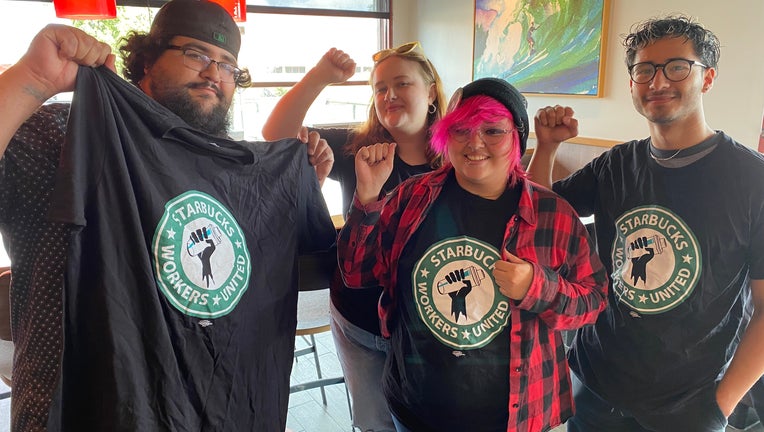Starbucks Workers United, a youth-led union movement, spreads to the North Bay

Workers from a Fairfield, CA store pose for a photo as they have decided to seek store unionization. (Aug. 22, 2023)
FAIRFIELD, Calif. - Workers at a Fairfield Starbucks store filed for an election to unionize last week, labor representatives say.
The location on Travis Boulevard is the latest in the coffee empire where baristas and other employees have started to organize, union SEIU 1021 announced.
But the youth-led union movement has been gaining momentum since it was inspired by a much smaller east coast coffee chain that started its union movement in 2019.
Casey Moore, a spokesperson from Starbucks Workers United, helped start the movement in August 2021. She says the movement was born out of pent-up frustration when workers, many of whom worked through the pandemic, realized they weren't getting basic benefits.
Starbucks employees with Starbucks Workers United and SBWU California said they are fighting for better wages and conditions.
"Our goal is to reach a collective bargaining agreement on our national proposals," Moore said. Those include expanded leave of absence, paid time off and quality health care.
Locally, one worker described the conditions of the Fairfield store.
"The conditions at our store are unacceptable for partners and unsatisfactory for our customers," said one Starbucks employee, Makaylah Turner-Sweeney, who started as a barista four years ago and is now a supervisor.
The store is plagued by bad plumbing, which has led to clogged toilets and a flood that covered the store with one inch of water, she said. There is also mildew behind the refrigerator. Management has not responded to complaints, she added.
"By forming a union here, we can make this workplace better for everyone. I've given four years of my life to this company, and I know we all deserve better," Turner-Sweeney said.
Starbucks has not responded to multiple inquiries from KTVU about this story.
In the last month, a San Francisco Starbucks store in the Sunset District voted to unionize. This was the second San Francisco Starbucks to unionize after a Castro location did so the year before. A Hayward Starbucks filed a petition with the National Labor Relations Board earlier this month, so workers at that store could unionize. And earlier this year, an Oakland Starbucks became the first in the city and second in less than a month in Alameda County to seek to form a union.
But it's not just a Bay Area trend. And the Starbucks Workers United movement is winning elections to unionize almost every week.
According to Starbucks Workers United, more than 350 stores have unionized in 42 states and Washington D.C. since December 2021.
Turner-Sweeney said she was inspired by the Starbucks Workers United movement.
"When I started seeing the movement online, it made me realize that we didn’t have to put up with this," she said. "We can take the power back in a sense."
She described the workers at her store as a "healthy mix" of young people and those who are older and supporting families. She said they're pro-union because of the labor cuts they've seen and threats to their benefits. Workers have a 20-hour-a-week requirement in order to obtain benefits. Turner-Sweeney said several employees have seen their hours fluctuate, making them nervous.
Chris Flink, a union representative with SEIU 1021, commented on the wave of unionization that Starbucks is seeing. "I think working people have long understood that something is wrong with our economy and they're seeing the successes other working people are building by sticking together in unions and finding inspiration there."
Research from the Center for American Progress shows that in actuality, both Gen Z and Millennials are more pro-union than previous generations were at their age.
SWU's Moore backs that up. "It's absolutely a youth-led movement. Many baristas are in high school, and college age. Gen Z grew up with the Great Recession, climate change and racial reckoning. We're already activists outside our work." She said many realized that they can be activists not only outside of work, but in the workplace as well.
Michael Bernick, former director of California's Employment Development Department and an employment attorney with law firm Duane Morris, sees this trend as a combination of labor shortages in direct service jobs and how the labor market has played out post-pandemic. "We've seen white-collar and tech layoffs, but at the same time, we've had shortages in retail, repair, and direct service jobs."
California has been a stronghold for union activity, especially in the public sector, Bernick said. "There's greater union activity here in California. It's been high-profile with the actors', writers' strikes (in Hollywood) and the hotel strikes. There was UPS and now autoworkers," Bernick said.
But the reality is that private-sector unions in the Golden State have actually been on the decline over the past 30 years.
Data from the U.S. Department of Labor's Bureau of Labor Statistics indicates the nationwide private sector unionization rate in 2022 was at 6%. By comparison, the public rate was at 33%.
The statistics report includes a breakdown from 2022 that shows how men continue to have higher union membership rates than women, the highest unionization rates are among protective service occupations (police, firefighters, security guards), and that Black workers remain more likely to be union members than their white, Hispanic, and Asian counterparts.
During the pandemic, there was the phenomenon of the great resignation and the proliferation of remote work. Attitudes towards the workplace shifted greatly.
It's clear to Turner-Sweeney that Starbucks workers are also ready for a change.
"A lot of people are unhappy and [are] choosing different career options. I don't blame them. It's easier to move on and find something better," she said, adding however that the union drive at her store shows that workers are committed to their jobs.
"We love this company," she said. "We wanna make a positive impact so our stores can be better."

